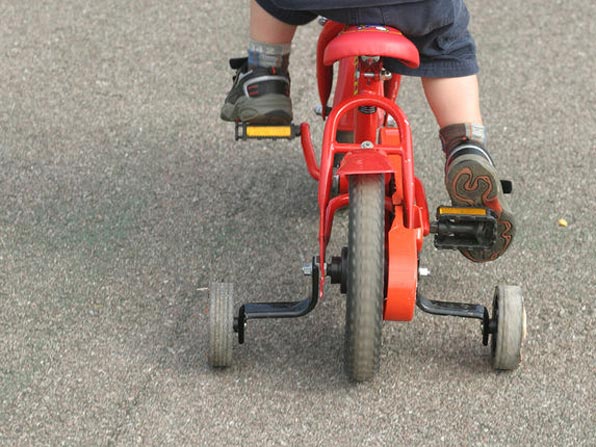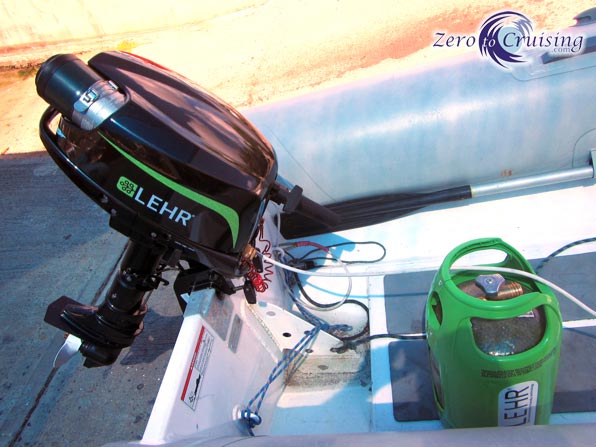Training wheels vs. no training wheels
A week ago I wrote a brief post where I suggested that there are significant differences between that which is experienced by cruisers departing from the east coast of North America and that which is experienced by their west coast counterparts. In that same post I (re)introduced fellow Canadians, bloggers and cruisers (I believe they prefer the term ‘Vagabonds’), Livia and Carol. Since I wrote that post, Livia and I have talked a bit about this subject and we both agreed to post more on it today.
- Disclaimer: My understanding of west coast cruising is at the level that all of my experience was in 2010 before we left, that being, based solely on hearsay. Although I have visited the west coast of Canada and the US, I have never sailed there. I have read about it though, and I’ve watched it on television. 😉
From the movie Days of Thunder:
Harry Hogge: What do you know about stock car racing?
Cole Trickle: Well… watched it on television, of course.
Harry Hogge: You’ve seen it on television?
Cole Trickle: ESPN. The coverage is excellent, you’d be surprised at how much you can pick up.
Harry Hogge: I’m sure I would.
When I first thought about this subject, it initially seemed to me that beginning cruising on the east coast was a bit like learning to ride a bike with training wheels attached to it. For most people, there is the option to travel in relatively protected waters all the way to Florida and no requirement to do any overnight passages all the way from Canada to Georgetown, Exuma. In other words, there is plenty of opportunity to develop confidence in one’s cruising abilities. When starting on the west coast, cruisers are thrust right away onto a two-wheeler, without the above described luxuries.

On further reflection though, it seems that these two routes would net cruisers a completely different skill set. Where as the west coast cruisers might gain offshore experience earlier on, those transiting the east coast would gain more varied experience in shallow water navigation, docking and anchoring.
Once down in the tropics, I think the differences in experiences magnify even more. While those on the west coast primarily end up in Mexico, east coast cruisers end up island hopping through the Caribbean, visiting numerous islands which can be culturally diverse. There are some where both fast food franchises and marine chandleries are still common place and others that are significantly more rustic. While both areas are warm, it seems that these two regions would, again, net a completely different skill set, and maybe even a different mind set.
Heading west across the Pacific, I think it makes little difference whether cruisers first cut their teeth on the west coast or transitioned to there from the Caribbean via the Panama Canal, all bets are off, and so are the training wheels. Instead of passages being measured in hours, the next ones will be measured in days and weeks. Does one group have a head start over the other? I can’t answer that. Livia and Carol have taken that big step into the Pacific. Given their experiences, I’m eager to read what they have to say about this.

The above pic is of a propane powered outboard engine that I saw in the yard at Budget Marine in St. Martin. My first thought was that it was totally impractical as propane is so much harder to come by down here than gasoline is. Livia told me that on many of the Pacific islands, the opposite is true. I would never have guessed it.


Those fiberglass propane tanks are becoming more and more popular on boats as well. You can get them in 10/11/15/20/25 lb. sizes. I think the 20lb weighs 43lbs full. And they don’t corrode or rust!
The tanks are great and I’d like to have one. My point about the engine is that it’s hard to find a place to get them filled. You wouldn’t be likely to borrow a bit of propane from a passing dinghy should you run out on the open water.
No doubt. Propane is best left to cooking from a Caribbean perspective. And if you run out, you can crank up the generator and use the microwave!
Microwave? 🙂
Of course, not all east coasters take the easy (?), slow, painful trip down the coast and through the Bahamas, many jump right out of New England or Cape Hatteras and get it over with in a couple of weeks or less.
“For most people, there is the option to travel in relatively protected waters all the way to Florida and no requirement to do any overnight passages all the way from Canada to Georgetown, Exuma.”
Right. I amended the post to show emphasis.
We plan on keeping the training wheels on mostly all the way down to the Caribbean and staying there for a year or two at least. I’m not so sure about taking the ditch the whole way. That sounds like a boring slog. We’ll see.
Some people love the ICW, some hate it. We enjoyed it, but did as many southbound travelers do and jumped outside around the top end of Georgia, making it to Florida in a couple of day sails from there.
That’s something to keep in mind. Thanks.
One reason many people jump outside at Georgia is because the ICW meanders a lot there, making southward progress slow. I’m sure it’s still pretty though.
Many say wait for a window , or a passing low off the East Coast and motor or sail to 65W and then head south. Any opinion on that? I guess I have one reason to thank my immigrant grandparents for stopping in NY.The Pacific seems to be a much more intimidating scenario.
Many people do that, although from what I have noted, not typically first timers.